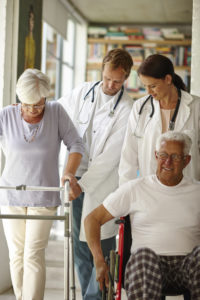PROGRAM
Wayne Community College’s health care careers Keep You Working
So many careers have felt the brunt of the recession, but one field that remains strong is health care. It’s true, not everyone is cut out to be a nurse, but have you considered a career in pharmacy, medical assisting, phlebotomy, or medical lab technology? Many of these opportunities may be a perfect fit for you and one that will keep you coming home each week with a paycheck. Add to that the fact the baby-boomers are moving into their golden years and healthcare officials will tell you there is plenty of work to go around.
If you’ve considered, but haven’t quite made up your mind which area is the most well-suited for you, then take a look at all of the health care programs WCC has to offer.
Medical Assisting

The Medical Assisting program provides high-quality educational experiences to prepare qualified graduates for medical assisting positions in physicians’ offices, clinics, or other medical settings. Administrative duties of the Medical Assistant include scheduling and receiving patients; maintaining medical records; handling telephone calls and office correspondence; filing insurance claims; and maintaining office accounts. Clinical duties include preparing patients for examination; obtaining and recording vital signs; taking medical histories; assisting with examination and treatments; collecting specimens and performing routing office laboratory procedures; providing patient instruction for diagnostic test, x-rays, and office procedures; and providing appropriate care in emergency situations.
Medical Lab Technician
If you like science, solving mysteries, and teamwork, Medical Laboratory Technology may be the career for you! The Medical Laboratory Technology (MLT) curriculum at Wayne Community College will prepare you to become a valuable part of a medical team of pathologists, technologists, and technicians working together to provide information to aid in the diagnosis, monitoring, and treatment of disease. Highly qualified MLTs perform clinical laboratory procedures in chemistry, hematology, microbiology and immunohematology. Medical Laboratory Technician was ranked #39 on the list of “100 Best Jobs of 2013” as ranked by the US News and World Report.
Pharmacy Technician Certificate
 The Pharmacy Technology Program seeks to provide qualified students with the technical skills and knowledge needed to practice in a variety of pharmacy settings. Pharmacy technicians must have a broad knowledge of pharmacy practice, and be skilled in the techniques required to order, stock, package, and prepare medications.
The Pharmacy Technology Program seeks to provide qualified students with the technical skills and knowledge needed to practice in a variety of pharmacy settings. Pharmacy technicians must have a broad knowledge of pharmacy practice, and be skilled in the techniques required to order, stock, package, and prepare medications.
Pharmacy technicians help pharmacists provide drugs and other health care products to patients. Pharmacy technicians may perform duties under the direct supervision of a pharmacist. The duties of pharmacy technicians include review prescriptions or requests for refills, fill prescriptions, count, pour, measure, or mix the medication, select a container, and prepare and attach a label, price and file the prescription. In addition, the pharmacy technician takes inventory of prescription and over-the-counter drugs. Pharmacy technicians work in hospital pharmacies, retail pharmacies, home health care pharmacies, nursing home pharmacies, clinic pharmacies, nuclear medicine pharmacies, and in-mail order prescription pharmacies.
Phlebotomy
If you want to join the medical field without spending years in college, we have a program for you…Phlebotomy! Because phlebotomy is a very specialized vocation, it can be mastered in one semester. The Phlebotomy curriculum will prepare you to obtain samples of blood and other specimens from patients promptly, efficiently and safely. Your coursework would include proper specimen collection and handling, communication skills and maintenance of patient data. As a graduate, you would qualify for employment in hospitals, clinics, physicians’ offices and other health care settings and you may be eligible for national certification as a phlebotomy technician. The U.S. Bureau of Labor Statistics predicts strong job growth for phlebotomists through the end of the decade.



